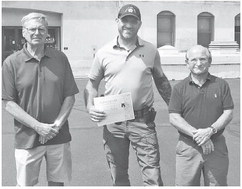No Colorado OTC tags will mean elk hunts will change for many out of state hunters


When I started teaching Hunters Ed. (more than 30 years ago now), every fall, at least one hunter called wanting to know when our next Hunters Ed. class started. They all sounded disappointed when I told them the next April.
They called because they received an invitation with a friend’s “Out West” hunting group to head west that year. “It’s just that this is a once in a lifetime hunt for me,” they all said. Other instructors got calls like that too.
They all hoped to hunt Colorado elk. You drove out, bought a license, and hunted. Except Colorado required anyone born after January 1, 1949 to possess a Hunters Ed. card. In Wisconsin they didn’t need a Hunters Ed. card if born prior to January 1, 1973. As the hunters in the state aged this ended, but back then I bet no less than fifty hunters just from our area missed out on a once in a lifetime hunt.
Colorado boasts the largest elk population in the U.S. Often over 300,000 elk, easily more than double the elk population of second place Montana. Colorado also sold mostly over the counter tags (OTC), meaning just like Wisconsin, you show up and buy a nonresident tag and go hunting.
Last week in the trend of resident vs. non-resident controversy, the Colorado Parks and Wildlife Commission voted to end OTC elk tags for archery hunting in 2025. The number of non-resident archery elk hunters now exceeds the number of resident hunters in Colorado. Colorado hunters voiced their dismay. Not only over the tag allocation, but with crowded public hunting areas too.
Other states offer OTC tags for elk. Idaho issues just over 12,000 non-resident elk tags. At one point a couple years ago, 61,000 non-resident hunters attempted to purchase those tags almost simultaneously.
Many Western states fund their wildlife management programs off of nonresident licenses. Fees, licenses, and tags all cost money and each state offers differing methods. Idaho’s nonresident tag cost of $651 multiplied by over 12,000 tags equals just over $7.8 million. Hence, the funding. I’m not picking on Idaho; Colorado’s OTC elk tag costs $803. Most die hard elk hunters employ a strategy of applying in multiple states for “draw tags.” If they don’t draw a tag, which often happens, they then plan to hunt in a state like Colorado with OTC tags. Applying for tags in the top eight states means paying out $2,588, and if not successful, those states refund $1,109. Focusing on perhaps four states with the highest probability of drawing a tag means laying out $1,259, and if unsuccessful you get back $680.
But you get preference points for your dollars, kind of like our black bear tag draw system. The difference is that it costs about three dollars for a point in Wisconsin. Our bear hunters often go 10 years between tags. Certain zones in certain states often require up to 10 years to draw an elk tag.
Hunting deer and elk in Western states involves a lot of planning, research, and applications if the hunter looks to hunt the high quality draw zones and states, the type and amount that makes one’s head hurt. Software subscriptions exist to help the hunters negotiate all this, for a subscription fee, of course. But either way, the process is demanding.
OTC archery tags in Colorado provide several area elk hunters the opportunity to hunt elk every year. This will be the last year that opportunity exists.
Some of the elk hunters that live in our area hunt elk each year with a backpack, sleeping bag, and small tent. They target shoot and work out year round preparing for a mountain hunt and pack out.
Others keep a string of horses for two weeks in the mountains each year hunting elk and living out of a wall tent. Colorado is the destination of choice most years.
Others employ a hybrid system, but the changes last week involve a major change to their lifestyle.
“I’ve wanted to move west for many years now and this kind of seals the deal,” a dedicated elk hunter told me and asked not to be named. “Most likely Idaho, I find it beautiful. I’ll move this fall or next spring. I don’t want my boss to know yet and it takes a lot to find a place to keep horses.”
He told me about a backpack hunter he knows that might move to Colorado so he can hunt elk every year.
The face and look of hunting constantly changes.
Through a
Decoy’s
E
ye



